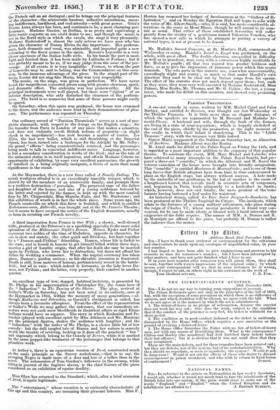Pearsfew Turantrenr.s.
A one-act comedy in verse, written by MM. Michel Cane and Jules Barbier, and entitled Le Berceau, was brought out last Wednesday at the Theatre Francais. It is little more than an elegant dialogue, of which the speakers are represented by M. Bressant and Madame Al.- nould-Plessy. A husband and wife, through the fault of the former, are living in a state of semi-separation ; which is happily abolished at the end of the piece, chiefly by the production at the right moment of the cradle in which their infant is slumbering. This is the "Little Treasure " story, with the treasure very little indeed.
Signor Mario reappeared at the Italiens on Saturday last, as Almaviva in Il Barbiere. Madame Alboni was the Rosina.
M. Arnal made his debut at the Palais Royal on Friday the 14th, and is regarded as a most important addition to the company of that popular theatre. To celebrate the event, MM. Marc Michel and Labiche, who have achieved so many triumphs on the Palais Royal boards, had pre- pared a three-act " comedie," in which the debutant and M. Ravel the veteran comedian of the house were brought into friendly antagonism. This "comedic" is entitled Mesdames de Montenfriche; and is one of those long farces that British adapters have from time to time endeavoured to plant on the English stage, but always without success. A hole made by the umbrella of one gentleman in the hat of another is the cause of a lengthened hatred, that reveals itself in eccentric acts of vengeance, and, beginning in Paris, leads ultimately to a knife-duel in Spain ; which, however, does not end fatally, the more prudent of the corn- batants having buttoned a loaf under his waistcoat.
An historical drama, called La Tour Saint Jacgues-le-Boucheris has been produced at the Theatre Imperial du Cirque. The incidents, which relate to the fortunes of a young military adventurer, take place during the reign of Charles VI; whose mental peculiarity is found very con- venient, for he can be made idiotic or blessed with a lucid interval as the exigencies of the fable require. The names of MM. A. Dumas and X. de Montepin are affixed to the piece, but probably M. Dumas is rather the indorser than the maker.


























 Previous page
Previous page